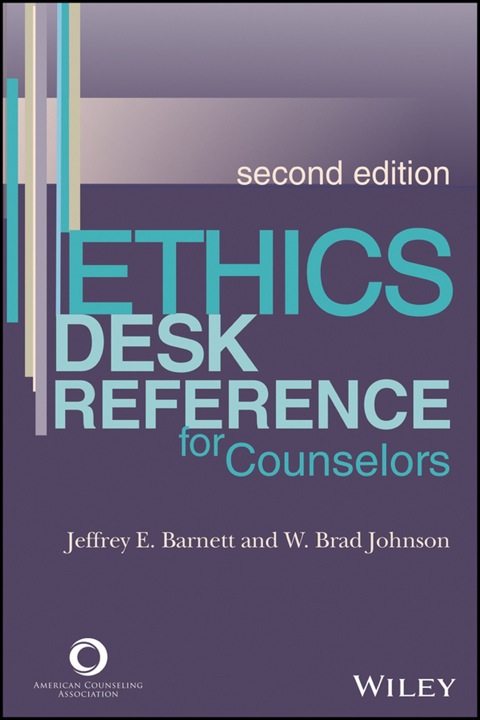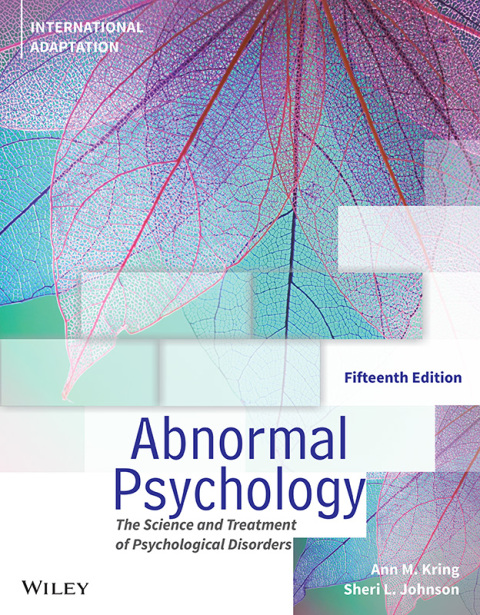Description
Efnisyfirlit
- Contents
- Foreword
- Preface
- About the Authors
- Part I: The American Counseling Association Code of Ethics
- The ACA Code of Ethics Preamble
- Section A: The Counseling Relationship
- Introduction
- A.1. Client Welfare
- A.1.a. Primary Responsibility
- A.1.b. Records and Documentation
- A.1.c. Counseling Plans
- A.1.d. Support Network Involvement
- A.2. Informed Consent in the Counseling Relationship
- A.2.a. Informed Consent
- A.2.b. Types of Information Needed
- A.2.c. Developmental and Cultural Sensitivity
- A.2.d. Inability to Give Consent
- A.2.e. Mandated Clients
- A.3. Clients Served by Others
- A.4. Avoiding Harm and Imposing Values
- A.4.a. Avoiding Harm
- A.4.b. Personal Values
- A.5. Prohibited Noncounseling Roles and Relationships
- A.5.a. Sexual and/or Romantic Relationships Prohibited
- A.5.b. Previous Sexual and/or Romantic Relationships
- A.5.c. Sexual and/or Romantic Relationships With Former Clients
- A.5.d. Friends or Family Members
- A.5.e. Personal Virtual Relationships With Current Clients
- A.6. Managing and Maintaining Boundaries and Professional Relationships
- A.6.a. Previous Relationships
- A.6.b. Extending Counseling Boundaries
- A.6.c. Documenting Boundary Extensions
- A.6.d. Role Changes in the Professional Relationship
- A.6.e. Nonprofessional Interactions or Relationships (Other Than Sexual or Romantic Interactions or
- A.7. Roles and Relationships at Individual, Group, Institutional, and Societal Levels
- A.7.a. Advocacy
- A.7.b. Confidentiality and Advocacy
- A.8. Multiple Clients
- A.9. Group Work
- A.9.a. Screening
- A.9.b. Protecting Clients
- A.10. Fees and Business Practices
- A.10.a. Self-Referral
- A.10.b. Unacceptable Business Practices
- A.10.c. Establishing Fees
- A.10.d. Nonpayment of Fees
- A.10.e. Bartering
- A.10.f. Receiving Gifts
- A.11. Termination and Referral
- A.11.a. Competence Within Termination and Referral
- A.11.b. Values Within Termination and Referral
- A.11.c. Appropriate Termination
- A.11.d. Appropriate Transfer of Services
- A.12. Abandonment and Client Neglect
- Section B: Confidentiality and Privacy
- Introduction
- B.1. Respecting Client Rights
- B.1.a. Multicultural/Diversity Considerations
- B.1.b. Respect for Privacy
- B.1.c. Respect for Confidentiality
- B.1.d. Explanation of Limitations
- B.2. Exceptions
- B.2.a. Serious and Foreseeable Harm and Legal Requirements
- B.2.b. Confidentiality Regarding End-of-Life Decisions
- B.2.c. Contagious, Life-Threatening Diseases
- B.2.d. Court-Ordered Disclosure
- B.2.e. Minimal Disclosure
- B.3. Information Shared With Others
- B.3.a. Subordinates
- B.3.b. Interdisciplinary Teams
- B.3.c. Confidential Settings
- B.3.d. Third-Party Payers
- B.3.e. Transmitting Confidential Information
- B.3.f. Deceased Clients
- B.4. Groups and Families
- B.4.a. Group Work
- B.4.b. Couples and Family Counseling
- B.5. Clients Lacking Capacity to Give Informed Consent
- B.5.a. Responsibility to Clients
- B.5.b. Responsibility to Parents and Legal Guardians
- B.5.c. Release of Confidential Information
- B.6. Records and Documentation
- B.6.a. Creating and Maintaining Records and Documentation
- B.6.b. Confidentiality of Records and Documentation
- B.6.c. Permission to Record
- B.6.d. Permission to Observe
- B.6.e. Client Access
- B.6.f. Assistance With Records
- B.6.g. Disclosure or Transfer
- B.6.h. Storage and Disposal After Termination
- B.6.i. Reasonable Precautions
- B.7. Case Consultation
- B.7.a. Respect for Privacy
- B.7.b. Disclosure of Confidential Information
- Section C: Professional Responsibility
- Introduction
- C.1. Knowledge of and Compliance With Standards
- C.2. Professional Competence
- C.2.a. Boundaries of Competence
- C.2.b. New Specialty Areas of Practice
- C.2.c. Qualified for Employment
- C.2.d. Monitor Effectiveness
- C.2.e. Consultations on Ethical Obligations
- C.2.f. Continuing Education
- C.2.g. Impairment
- C.2.h. Counselor Incapacitation, Death, Retirement, or Termination of Practice
- C.3. Advertising and Soliciting Clients
- C.3.a. Accurate Advertising
- C.3.b. Testimonials
- C.3.c. Statements by Others
- C.3.d. Recruiting Through Employment
- C.3.e. Products and Training Advertisements
- C.3.f. Promoting to Those Served
- C.4. Professional Qualifications
- C.4.a. Accurate Representation
- C.4.b. Credentials
- C.4.c. Educational Degrees
- C.4.d. Implying Doctoral-Level Competence
- C.4.e. Accreditation Status
- C.4.f. Professional Membership
- C.5. Nondiscrimination
- C.6. Public Responsibility
- C.6.a. Sexual Harassment
- C.6.b. Reports to Third Parties
- C.6.c. Media Presentations
- C.6.d. Exploitation of Others
- C.6.e. Contributing to the Public Good (Pro Bono Publico)
- C.7. Treatment Modalities
- C.7.a. Scientific Basis for Treatment
- C.7.b. Development and Innovation
- C.7.c. Harmful Practices
- C.8. Responsibility to Other Professionals
- C.8.a. Personal Public Statements
- Section D: Relationships With Other Professionals
- Introduction
- D.1. Relationships with Colleagues, Employers, and Employees
- D.1.a. Different Approaches
- D.1.b. Forming Relationships
- D.1.c. Interdisciplinary Teamwork
- D.1.d. Establishing Professional and Ethical Obligations
- D.1.e. Confidentiality
- D.1.f. Personnel Selection and Assignment
- D.1.g. Employer Policies
- D.1.h. Negative Conditions
- D.1.i. Protection From Punitive Action
- D.2. Provision of Consultation Services
- D.2.a. Consultant Competency
- D.2.b. Informed Consent in Formal Consultation
- Section E: Evaluation, Assessment, and Interpretation
- Introduction
- E.1. General
- E.1.a. Assessment
- E.1.b. Client Welfare
- E.2. Competence to Use and Interpret Assessment Instruments
- E.2.a. Limits of Competence
- E.2.b. Appropriate Use
- E.2.c. Decisions Based on Results
- E.3. Informed Consent in Assessment
- E.3.a. Explanation to Clients
- E.3.b. Recipients of Results
- E.4. Release of Data to Qualified Personnel
- E.5. Diagnosis of Mental Disorders
- E.5.a. Proper Diagnosis
- E.5.b. Cultural Sensitivity
- E.5.c. Historical and Social Prejudices in the Diagnosis of Pathology
- E.5.d. Refraining From Diagnosis
- E.6. Instrument Selection
- E.6.a. Appropriateness of Instruments
- E.6.b. Referral Information
- E.7. Conditions of Assessment Administration
- E.7.a. Administration Conditions
- E.7.b. Provision of Favorable Conditions
- E.7.c. Technological Administration
- E.7.d. Unsupervised Assessments
- E.8. Multicultural Issues/Diversity in Assessment
- E.9. Scoring and Interpretation of Assessments
- E.9.a. Reporting
- E.9.b. Instruments With Insufficient Empirical Data
- E.9.c. Assessment Services
- E.10. Assessment Security
- E.11. Obsolete Assessment and Outdated Results
- E.12. Assessment Construction
- E.13. Forensic Evaluation: Evaluation for Legal Proceedings
- E.13.a. Primary Obligations
- E.13.b. Consent for Evaluation
- E.13.c. Client Evaluation Prohibited
- E.13.d. Avoid Potentially Harmful Relationships
- Section F: Supervision, Training, and Teaching
- Introduction
- F.1. Counselor Supervision and Client Welfare
- F.1.a. Client Welfare
- F.1.b. Counselor Credentials
- F.1.c. Informed Consent and Client Rights
- F.2. Counselor Supervision Competence
- F.2.a. Supervisor Preparation
- F.2.b. Multicultural Issues/Diversity in Supervision
- F.2.c. Online Supervision
- F.3. Supervisory Relationship
- F.3.a. Extending Conventional Supervisory Relationships
- F.3.b. Sexual Relationships
- F.3.c. Sexual Harassment
- F.3.d. Friends or Family Members
- F.4. Supervisor Responsibilities
- F.4.a. Informed Consent for Supervision
- F.4.b. Emergencies and Absences
- F.4.c. Standards for Supervisees
- F.4.d. Termination of the Supervisory Relationship
- F.5. Student and Supervisee Responsibilities
- F.5.a. Ethical Responsibilities
- F.5.b. Impairment
- F.5.c. Professional Disclosure
- F.6. Counseling Supervision Evaluation, Remediation, and Endorsement
- F.6.a. Evaluation
- F.6.b. Gatekeeping and Remediation
- F.6.c. Counseling for Supervisees
- F.6.d. Endorsements
- F.7. Responsibilities of Counselor Educators
- F.7.a. Counselor Educators
- F.7.b. Counselor Educator Competence
- F.7.c. Infusing Multicultural Issues/Diversity
- F.7.d. Integration of Study and Practice
- F.7.e. Teaching Ethics
- F.7.f. Use of Case Examples
- F.7.g. Student-to-Student Supervision and Instruction
- F.7.h. Innovative Theories and Techniques
- F.7.i. Field Placements
- F.8. Student Welfare
- F.8.a. Program Information and Orientation
- F.8.b. Student Career Advising
- F.8.c. Self-Growth Experiences
- F.8.d. Addressing Personal Concerns
- F.9. Evaluation and Remediation
- F.9.a. Evaluation of Students
- F.9.b. Limitations
- F.9.c. Counseling for Students
- F.10. Roles and Relationships Between Counselor Educators and Students
- F.10.a. Sexual or Romantic Relationships
- F.10.b. Sexual Harassment
- F.10.c. Relationships With Former Students
- F.10.d. Nonacademic Relationships
- F.10.e. Counseling Services
- F.10.f. Extending Educator–Student Boundaries
- F.11. Multicultural/Diversity Competence in Counselor Education and Training Programs
- F.11.a. Faculty Diversity
- F.11.b. Student Diversity
- F.11.c. Multicultural/Diversity Competence
- Section G: Research and Publication
- Introduction
- G.1. Research Responsibilities
- G.1.a. Conducting Research
- G.1.b. Confidentiality in Research
- G.1.c. Independent Researchers
- G.1.d. Deviation From Standard Practice
- G.1.e. Precautions to Avoid Injury
- G.1.f. Principal Researcher Responsibility
- G.2. Rights of Research Participants
- G.2.a. Informed Consent in Research
- G.2.b. Student/Supervisee Participation
- G.2.c. Client Participation
- G.2.d. Confidentiality of Information
- G.2.e. Persons Not Capable of Giving Informed Consent
- G.2.f. Commitments to Participants
- G.2.g. Explanations After Data Collection
- G.2.h. Informing Sponsors
- G.2.i. Research Records Custodian
- G.3. Managing and Maintaining Boundaries
- G.3.a. Extending Researcher–Participant Boundaries
- G.3.b. Relationships With Research Participants
- G.3.c. Sexual Harassment and Research Participants
- G.4. Reporting Results
- G.4.a. Accurate Results
- G.4.b. Obligation to Report Unfavorable Results
- G.4.c. Reporting Errors
- G.4.d. Identity of Participants
- G.4.e. Replication Studies
- G.5. Publications and Presentations
- G.5.a. Use of Case Examples
- G.5.b. Plagiarism
- G.5.c. Acknowledging Previous Work
- G.5.d. Contributors
- G.5.e. Agreement of Contributors
- G.5.f. Student Research
- G.5.g. Duplicate Submissions
- G.5.h. Professional Review
- Section H: Distance Counseling, Technology, and Social Media
- Introduction
- H.1. Knowledge and Legal Considerations
- H.1.a. Knowledge and Competency
- H.1.b. Laws and Statutes
- H.2. Informed Consent and Security
- H.2.a. Informed Consent and Disclosure
- H.2.b. Confidentiality Maintained by the Counselor
- H.2.c. Acknowledgment of Limitations
- H.2.d. Security
- H.3. Client Verification
- H.4. Distance Counseling Relationship
- H.4.a. Benefits and Limitations
- H.4.b. Professional Boundaries in Distance Counseling
- H.4.c. Technology-Assisted Services
- H.4.d. Effectiveness of Services
- H.4.e. Access
- H.4.f. Communication Differences in Electronic Media
- H.5. Records and Web Maintenance
- H.5.a. Records
- H.5.b. Client Rights
- H.5.c. Electronic Links
- H.5.d. Multicultural and Disability Considerations
- H.6. Social Media
- H.6.a. Virtual Professional Presence
- H.6.b. Social Media as Part of Informed Consent
- H.6.c. Client Virtual Presence
- H.6.d. Use of Public Social Media
- Section I: Resolving Ethical Issues
- Introduction
- I.1. Standards and the Law
- I.1.a. Knowledge
- I.1.b. Ethical Decision Making
- I.1.c. Conflicts Between Ethics and Laws
- I.2. Suspected Violations
- I.2.a. Informal Resolution
- I.2.b. Reporting Ethical Violations
- I.2.c. Consultation
- I.2.d. Organizational Conflicts
- I.2.e. Unwarranted Complaints
- I.2.f. Unfair Discrimination Against Complainants and Respondents
- I.3. Cooperation With Ethics Committees
- Glossary of Terms
- Part II: Decision Making and Ethical Practice in Counseling
- An Ethical Decision-Making Process for Counselors
- Introduction
- The Nine Stages of Ethical Decision Making
- Stage 1: Define the Situation Clearly
- Stage 2: Determine Who Will Be Affected
- Stage 3: Refer to Both Underlying Ethical Principles1 and the Standards of the ACA Code of Ethics
- Stage 4: Refer to Relevant Laws/Regulations and Professional Guidelines
- Stage 5: Reflect Honestly on Personal Feelings and Competence
- Stage 6: Consult With Trusted Colleagues
- Stage 7: Formulate Alternative Courses of Action
- Stage 8: Consider Possible Outcomes for All Parties Involved
- Stage 9: Make a Decision and Monitor the Outcome
- References
- Ethical Issues Regarding Culture and Diversity
- Actively Seek Cultural Competence
- Pursue Awareness of Your Own Cultural Values and Biases
- Do Not Condone or Engage in Discrimination
- Understand and Respect Clients’ Attitudes and Values Regarding Counseling
- Take Time With Informed Consent
- Be Especially Careful to Provide Informed Consent for Assessment
- Use Caution When Selecting Assessment Instruments and Techniques
- Think Twice Before Rendering a Diagnosis
- Support Clients’ Cultural Networks
- Demonstrate Flexibility With Respect to Bartering and Receiving Gifts
- Make Appropriate Referrals When You Lack Cultural Competence
- Be Alert to the Role of Diversity in the Supervisory Relationship
- Infuse Counselor Training Programs With Multiculturalism
- Design and Implement Culturally Appropriate Research Studies
- References
- Confidentiality
- Provide Clear Informed Consent
- Inform Couples, Families, and Groups About the Unique Risks to Confidentiality Generated by These Co
- Pay Special Attention to Office Design
- Clarify Office Practices and Procedures
- Take Responsibility for Staff Training
- Be Cautious When Responding to Requests for Information
- Monitor Record Storage and Disposal
- Inform Clients About Consultation and Supervision
- Be Thoughtful About Using Technology
- References
- Exceptions to Confidentiality
- Limits to Confidentiality When Counseling Minors
- Reporting Requirements With Minors
- Reporting Requirements With Elderly or Other Vulnerable Adults
- Dangerousness and the Duty to Warn and Protect
- Third-Party Requests for Services
- Court-Ordered Services
- References
- Counseling Suicidal Clients
- References
- Boundaries and Multiple Relationships in Counseling
- Key Multiple Relationship Questions
- Be Cautious About Bartering
- Think Carefully About Accepting Gifts
- Do Not Solicit Client Testimonials
- Romantic and Sexual Relationships With Clients Are Always Off Limits
- References
- Competence
- The Competence Continuum
- Scope of Competence
- Competence Over Time
- Changes in the Profession
- Scientific Basis for Decisions
- Multicultural Competence
- Monitoring Competence
- Scope of Counseling Practice
- Specialized Competence
- Limits of Competence
- Self-Care and Competence
- Employment Decisions
- References
- Supervision
- Competence
- Informed Consent
- Assessing Training Needs
- Intensity of Supervision
- Representation to Clients
- Attention to Ethical and Legal Issues
- Attention to Diversity Issues
- Boundaries and Multiple Relationships
- Supervisor as Gatekeeper
- Supervisor as Role Model
- References
- Managed Care
- Informed Consent
- Confidentiality and Its Limits
- Competence
- Contracts
- Utilization Review
- Termination and Abandonment
- References
- Integrating Technology Into Counseling Practice
- Conclusions
- References
- Termination and Abandonment
- Client-Motivated Reasons for Termination
- Counselor-Motivated Reasons for Termination
- Recommendations for Terminating the Counseling Relationship
- References
- Responding to Subpoenas and Court Orders, Lawsuits, and Ethics Complaints
- Subpoenas and Court Orders
- Ethics Complaints and Lawsuits
- References
- Appendix: Resources for Counselors
- Index
- Technical Support
- End User License Agreement







Reviews
There are no reviews yet.